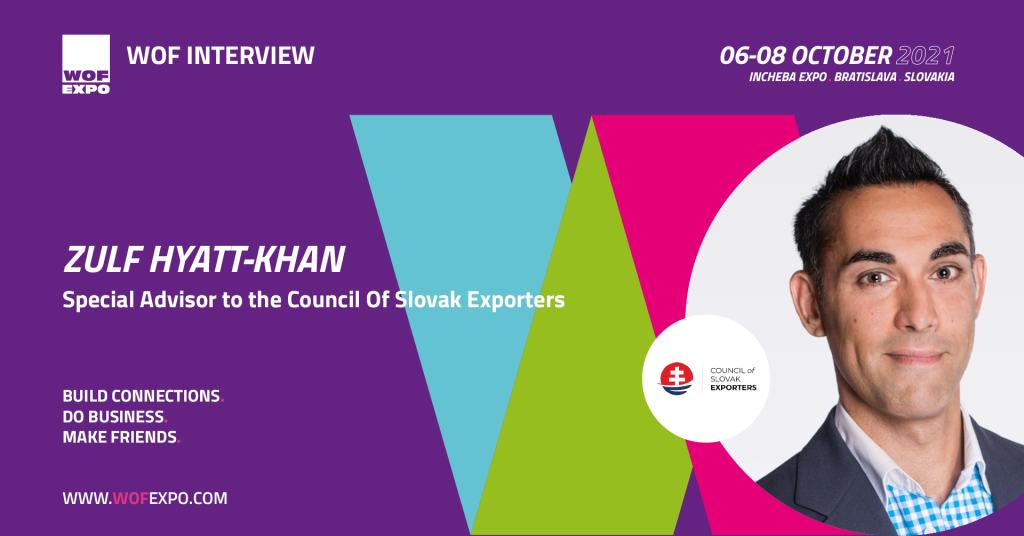Interview with Zulf Hyatt-Khan
| Mr. Zulf Hyatt-Khan is Special Advisor to the Council Of Slovak Exporters, whereby he acts a strategic link to its members with aspirations to expand in the MENA region where he spent over a decade or so working with/for/closely with various Government/Private Sector Institutions in various leadership roles specializing in negotiating large scale contracts and commercializing assets. With over 20 years’ experience and having lived and worked in multiple different countries; Zulf brings a culturally nuanced approach to global business practices which is what drew him to the CSE and its ambition to change the way export is prioritized in Slovakia. |
| 1. Would you please tell us what are the main goals of the Council of Slovak Exporters and what are the services and support offered to its members? At the Council of Slovak Exporters (CSE) our principal goal is to act as a go-between the Private Sector who we represent through our 70+ strong members, relevant state institutions, and financial organizations for all export-related issues. Secondly, which is unique to Slovakia, our website www.exporteri.sk acts as a hub for all current events and all export-related concerns being communicated under one roof, in aggregated form. On top of this, we provide in-depth economic and political analysis in the form of a weekly newsletter which gives a complete rundown on critical issues that may or may not impact export for Slovak entities, as well as a weekly podcast with our members whose CEOs detail their export journeys, challenges, and successes. Our ultimate goal is to become a trusted go-to platform for all exporters to be able to voice their concerns and act as the intermediary and interlocutor with all the relevant actors I’ve mentioned, which should in theory gives them confidence in the system and also the confidence to broaden their exporting scope. 2. What do you consider to be the main challenges of export at the moment? “SMEs in the Slovak Republic are very likely to have some sort of exporting experience. As a small landlocked country with four EU neighbors, the Slovak Republic has large trading potential, and more than one-half of firms in the Slovak Republic export within the single market. Small firms were more likely to export to another EU country than small firms in any other OECD country, with nearly every other small firm being an exporter. Similarly, medium-sized firms had one of the highest propensities of being an intra-EU exporter among the OECD countries, 69% as of 2017” according to the OECD. However, Slovak SMEs lag behind in exports to markets located beyond the EU borders. Only 8% of small firms, and 30% of medium-sized firms in the Slovak Republic have non-EU exports, both below the OECD averages (15% and 37% respectively). Again, the OECD makes the point “This stands in contrast with countries like Slovenia, Italy and Sweden where at least one-fifth of small firms and one-half of medium-sized firms export outside the EU. Exporting to more distant countries might be riskier, but also more lucrative. As a majority of SMEs already possess exporting experience, the next step of reaching more distant markets could be quite accessible and increase profitability” – this however as we all know is not the case in reality, with relatively few Slovak exporters willing to take the plunge overseas. As you can see from the OECD picture, there is substantial need to start viewing export from a different lens than has been traditional so far. Added to the overall Slovak export picture it doesn’t take a rocket scientist to understand the grave impact that Covid 19 has had on export and many other areas too. With borders closed, cargo held up and commerce halted across numerous sectors and for some, the effects have been terminally damaging. The minute the flow of goods is disrupted from its regular schedule and for such lengthy periods of time, the impact is detrimental to multiple to supply chains which in turn has a drastic domino effect not only on export but the wider economy too, and unfortunately, Slovakia was not immune to this either. Currently, the challenges will be; ramping up and being able to deliver on schedule and making sure everything is Covid compliant – this will obviously, slow things down, but hopefully, the situation will normalize sooner rather than later – we can’t afford for it not to. 3. In Slovakia, the trading sector is one of the most prolific ones. The cars and spare parts, alongside petroleum are considered the most exported goods. How did the pandemic and export restrictions affect Slovak supply and demand capacity? Even though the first quarter of 2021 boasted some fairly encouraging numbers with regards to export as a whole, one has to temper this optimism with context. Firstly, those numbers are benchmarked against one of the worst years in history and secondly what’s been highlighted for some time now is the overreliance on the automotive and manufacturing sectors without so much aggressive development and investment into areas such as Tourism, Agriculture, and the Circular and Digital Economies. While some of these examples are not specific to export the impact of the pandemic highlighted the shortage of a more diverse economy and the need to think bigger. In terms of restrictions and impact on supply and demand each sector felt the pinch in its own individual way, but we can simplify this by using the renowned Slovak automotive industry as an example; if plants and factories are closed then the supply chain breaks down entirely and that impacts delivery and lead times, which affects distribution, stocks, and shares, and so forth – so the whole pandemic was an unmitigated disaster which no one had built-in provisions for. I think another of the biggest takeaways from the pandemic is liquidity and what we saw, unfortunately, was a lack of human retention and struggles with basic payroll – so from a deeply individual perspective, looking at supply and demand from a bottom-up view, the situation was bleak for so very long. There is cause for optimism of course and that’s buoyed by encouraging numbers now and end sight to the pandemic. Slovakia’s biggest challenge now is rebooting its economy and deploying the EU funds in areas that need it the most and planning for a brighter future. With one of the most ambitious post-pandemic recovery plans in place, and one that was much celebrated by its EU cohorts, the challenge will not be the desire to implement the strategies put in place, it will be whether the capacity to do so exists. 4. Tell us about the key areas where export business can improve the most and why? This is a much simpler question to answer, and as an outsider looking in, I can tell you it’s communication, branding, and increasing faith in creaking public institutions. There are many potentially global brands here in Slovakia but a reluctance and a historically imprinted fear to venture into unknown markets have halted progress for so many of these types of companies with untapped potential. Roughly 90% of Slovakia’s export is to the EU of which the largest portion of that is to Germany, which demonstrates a very narrow export perspective. In terms of communication; it’s about ego and putting a marker down saying that there is a Slovak product that is a world-beater, but for multiple reasons companies don’t adopt this approach, and it’s sad to see that many of these offerings deserve a wider audience, aren’t getting that visibility and awareness. The Slovak businesses who have been successful exporters have taken risks and gambled on many occasions, and you can speak to many of our members who have told us, that they did it all on their own, without any sort of institutional or financial support, and simply through their own exploratory endeavors. Faith in public institutions has also been at an all-time low, with many of them backward in coming forward to help Slovak export. One of our mandates here at the CSE is to mend these bridges and also to impress upon the public sector that export accounts for such a vast proportion of the GDP and should be treated with the respect and attention it deserves and much more the than the cursory sidenotes it currently receives. 5. With the current pandemic situation, how is managing the spread of coronavirus impacting international trade? We would need at least a week to unpack the economic consequences of Covid 19 and how much more into the future it will still impact us, much of which is still intangible for us to calculate now, however, I will say one thing; the limit of tactile interaction and face to face transactions have paved the way for a more innovative approach to digitization and having to adapt quickly to ever-evolving business practices.. On the negative side, and from a primal perspective much has been lost by not being able to engage in person. Adaptability and shifting models have been the only way for businesses to survive and the ones who reacted slowest are the ones suffering the most. You will hear terms like ‘hybrid models’ and ‘k-shaped’ economies, and much as I loathe these expressions, one has to be aware that flexibility will be the way of the future and companies will need to build in provisions for similar type pandemics so as not to interrupt progress again when they occur. 6. Last, but not least, what is your opinion on positioning the WOF Expo in the Central and Eastern Europe region? We at the CSE are delighted that WOF Expo is happening in this region; first and foremost, the interconnectivity of Central and Eastern Europe is often forgotten within a global context, we only need to look at recent history to see the significance of the Danube for so much trade. As far as WOF Expo launching its inaugural event here in Bratislava, we couldn’t be happier to actively participate, and we also hope that WOF Expo can act as a catalyst to other events organizers who were reluctant to see Slovakia as a hub for such activities. |
 | Council of Slovak Exporters is an association of private entities. At the beginning of April 2020, when the Covid-19 related crisis culminated, a newly emerged Export Support Initiative called for Slovak exporters to unite. In two months, this Initiative was supported by more than 130 companies. This demand led to establishing Council of Slovak Exporters, which is a business platform that is open to all Slovak businesses which either export or have an ambition to access foreign markets. The aim is to connect exporters and facilitate dialogue with state institutions, international organizations and financial institutions, including banks, insurers etc.
www.exporteri.sk |

